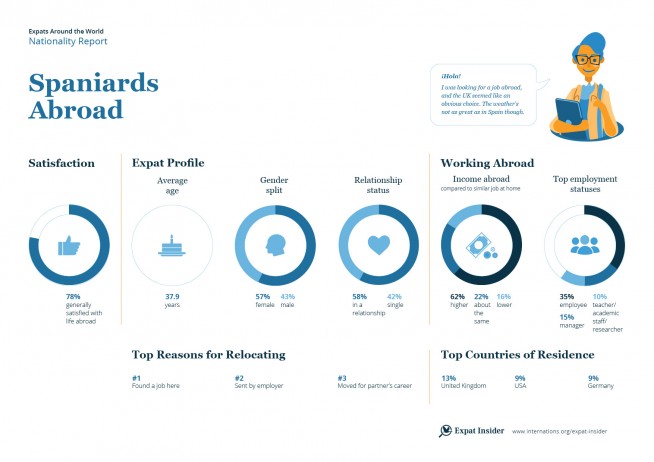Avoiding the Spanish Economy
- Almost half have postgraduate or master’s degree
- Only 15% plan on staying forever
- Typically get higher salaries than at home
- Nearly four-fifths (78%) generally happy with life abroad
Seeking Jobs Elsewhere
Spanish expats generally move abroad for work: 19% found a job on their own and 16% were sent abroad by their employer. Close to two-thirds of Spanish expats (66%) say they saw the economy and/or labor market of their future host country as a potential benefit before relocating — most likely due to Spain’s slowly recovering economy and still high unemployment rates.
Half of working Spanish expats are either employees (35%) or managers (15%), and the most common sectors are IT (11%), education (10%), and finance (10%). Almost three-fifths of expats from Spain (59%) are happy with their career prospects, compared to a global average of 53%. Spaniards abroad are generally highly educated: almost half (49%) have a postgraduate or master’s degree, while a further 7% have a PhD.
For most Spanish expats, the move abroad paid off: over three-fifths (62%) earn more than they would in a similar job back home, and half say their current disposable household income is more than enough to cover their expenses. With 42.8 hours, full-time working hours for Spanish expats are also below the global average — a typical workweek is 44.3 hours.
A Temporary Move
Spanish expats are not planning to stay long in their host country: while close to three in ten of all respondents (29%) plan to stay abroad forever, only 15% of Spanish expats feel the same way. Moreover, only 7% have acquired the citizenship of their current host country, compared to 12% worldwide. Knowing that their stay is only temporary could explain why Spanish expats take so long to feel comfortable: one-fifth say they don’t feel at home yet, and 12% think they will never feel at home.
When looking at the global share of respondents that have previously lived abroad, only a quarter have already lived in three or more foreign countries, compared to 35% of Spaniards. Despite this expat experience, over two-fifths (44%) think it’s very likely that they will return to Spain at one point — eleven percentage points more than their global counterparts.
The most popular country to relocate to among Spanish expats is the UK (13%), followed by the USA (9%), and Germany (9%). Eight out of the ten most common destinations are in Europe, explaining why 40% say they considered the distance to their home country a potential benefit prior to relocating. Moving away from the Mediterranean, however, also means that 41% saw the climate and weather of their future home as a potential drawback.
Foreign Language? No Hay Problema
The Spanish seem to love speaking other languages — 16% say that one of the reasons for moving abroad was to improve their language skills, and 51% considered language a potential benefit prior to their move. Once abroad, more than half of Spanish respondents (51%) say they speak the local language(s) of their host country fairly or very well; a further 14% say it’s the same as their mother tongue. It’s lucky they have these linguistic abilities — almost half of respondents (49%) say it would be difficult to live in their host country without speaking the local language. A Spanish expat in Sweden, for example, states, “if you're serious about staying you should prioritize learning Swedish”.
Barely Bursting the Expat Bubble
Over half of Spanish expats (54%) are generally happy with making new friends abroad, although just under a third (32%) consider it easy to make local friends. In fact, over two in five Spaniards (42%) say their social circle is mostly other expats, compared to a third globally. They find that the main barriers to making local friends are cultural issues (45%) and being surrounded mostly by other expats at work (41%).
However, this does not mean that Spanish expats only stick together: almost two-fifths of those in a relationship (38%) have a partner from their host country. In general, Spanish expats are more likely to move abroad without being in a relationship: 32% only met their partner after arriving in their current country of residence and 42% are currently single, compared to a 35% globally.
Further Reading
- El Pais: IMF raises Spain’s 2017 growth forecast to 2.6% as global economy recovers
- Financial Times: Spanish unemployment falls 112k, driving jobless rate to 2009 low
- Expat Insider 2017 — Spain: More Than a Mediterranean Retirement Haven
- Expat Insider 2016 — Spaniards: Looking for Better Careers Abroad




